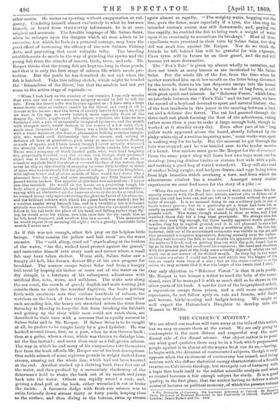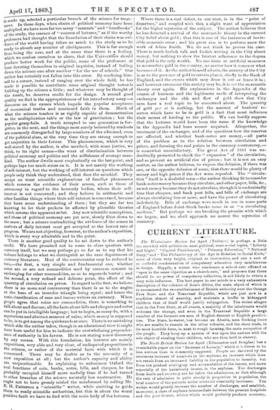THE CURRENCY MYSTERY.*
WE are afraid our readers will turn away at the title of this notice, but we may re-assure them at the outset. We are only going to contemplate in the most distant and respectful way the most dismal side of the dismal science. Our object rather is to Iva out what good qualities there may be in a book which preposseees people against it in almost all the ways a book can do so,—having, to begin with, the dreariest of controverted subjects, though it only appears when the excitement of controversy has ceased, and being written with the diffuse rhetorical energy characteristic of a Scotch treatise on Calvinistic theology, but strangely out of harmony with a topic that lends itself to the coldest scientific analysis and when so treated becomes a fair enough subject for study. It is it good quality, in the first place, that the author having to deliver a short course of lectures on political economy, of which the present volume is made up, selected a particular branch of the science for treatment. In these days, when chairs of political economy have been multiplied,we have seen far too many "manuals" and "handbooks" of the study, the essence of "courses of lectures," as if the worthy professors had thought that the foundation of their chairs was evidence of the world having taken so much t.) the study as to be ready to absorb any number of abridgments. This is far enough from being the case, and at the same time there is a feeling, which we confess ourselves to share, that the Universities should produce better work for the public, some of the professors at least devoting themselves to original inquiries, instead of boiling down the science one after another "for the use of schools." Our author has certainly not fallen into this error. By confining himself to a corner, instead of ranging over the whole field, he has made it possible to contribute some original thought towards building up the science a little ; and whatever may be thought of the result, he deserves credit for the design. A second good quality we find is the appropriateness of his introductory essay—a discourse on the causes which impede the popular acceptance of economical truths and continued faith in them. Much of what the science teaches is as rigidly capable of demonstration as the multiplication-table or the law of gravitation ; but the popular grasp fails. A truth accepted in one generation is forgotten in the next, and the things most surely believed by students are commonly disregarded by large numbers of the educated, even of the political class, at the very time they are strong enough to get majorities in their favour. This phenomenon, which is very well stated by the author, is also ascribed, with some justice, we think, to its right causes—the want of discrimination between political economy and politics and the selfishness of average mankind. The author dwells most emphatically on the last point, and perhaps lays too much stress on it. It is not merely the working of self-interest, but the working of self-interest on questions which people only think they understand, that does the mischief. They accept on trust scientific explanations of familiar phenomena which reverse the evidence of their senses, such as those of astronomy in regard to the heavenly bodies, where their selfinterest is not concerned ; and they believe in arithmetic and other familiar things where their self-interest is concerned, because they have some understanding of them ; but they are far too knowing to let their pockets be affected by plausible theories which reverse the apparent order. Any new scientific conceptions, and those of political economy are yet new, slowly filter down to the mass ; but a science contradicting the evidence of the senses in matters of daily interest must get accepted at the lowest rate of progress. We are not objecting, however, to the author's exposition, which is every way admirable and to the point.
There is another good quality to be set down to the author's credit. We have promised not to come to close quarters with currency itself, but we may perhaps go so far as to say that his volume belongs to what we distinguish as the sane department of currency literature. Most of the controversies may be reduced to two,—the first, a very simple and fundamental one, whether coins are or are not commodities used by common consent in exchanging for other commodities, so as to supersede barter ; and the second, a very refined and delicate point, the effect of the quantity of circulation on prices. In regard to the first, we believe there is no more real controversy than there is as to the angles at the base of an isosceles triangle being equal ; and hence the main classification of sane and insane writers on currency. When people agree that coins are commodities, there is something to talk about and discuss; all the facts about bills and cheques and notes can be put in intelligible language; but to begin, as many do, with a mysterious and abstract measure of value, which money is supposed to be, is to get among the quicksands at once. There is no mistaking Which side the author takes, though in an educational view it might have been useful for him to indicate the overwhelming preponderance of authority in his favour. fie is not stating a new discovery by any means. With this foundation, his lectures are mainly expositions, very able and very clear, of undisputed propositions in the science, or rather of the material facts with which it is concerned. There may be doubts as to the necessity of a new exposition at all ; but the author's capacity and ability are unquestionable. In explaining to unbusiness Oxford the real functions of coin, banks, notes, bills, and cheques, he has probably occupied himself more usefully than if he had turned to other branches of the science naturally less unattractive. He
Ought not to have grossly misled the uninformed by calling Mr. 1. H. Patterson a "scientific" writer, while omitting to guide them to really scientific authorities, but this is about the worst Positive fault we have to find with the main body of the lectures. Where there is a real defect, in our view, is in the "point of departure," and coupled with this, a slight want of appreciation for the higher mysteries of the subject. The author believes that he has detected a revival of the mercantile theory iu the current City belief about gold ; that this is one of the instances of invincible economic error ; and his great aim is to perform anew the work of Adam Smith. We do not think he proves his case. There is much foolish talk and foolish writing in the City about money, but nothing to show the faintest adherence to the dogma that gold is the only wealth. No one hints at artificial measures to accumulate gold in the country, no matter how it comes or what becomes of it. As the author himself admits, the anxiety of the City is as to the presence of gold in certain places, chiefly in the Bank of England, and the events which may draw it out or leave it iu ; and however erroneous this anxiety may be, it is not the mercantile theory over again. Ilis explanations hi the Appendix of the course of business and the legitimate mode of interpreting the exchanges and the ebb and flow of gold show that City men have a real topic to be concerned about. The quantity of gold per se is nothing, but the amount of bankers' reserves which have to be in gold is a fact that must influence their means of lending to the public. We can hardly suppose that the lectures would have been the same if the knowledge in the Appendix had been sooner acquired. Altogether, the treatment of the exchanges, and of the questions how the reserves are affected, and whether bank-notes are money,—all parts of the problem as to the relation between circulation and prices, and forming the real points in the currency controversy,— is somewhat unsatisfactory. The great Act of 1811 was undoubtedly promoted to check the " expausiou " of the circulation, and so prevent an artificial rise of prices ; but it is not an easy matter, as the author believes, to expose the delusion, if there was one, or the opposite delusion of some, that there would be plenty of money and high prices if the Act were repealed. The "circulation " itself is a doubtful term—the author thinking fit to consider bank-notes money because they circulate, and other paper, bills, &c., as not money because they do not circulate, though it is undoubtedly true that cheques, and bank post bills, and bills of exchange are always circulating less or more, and have the power of circulating indefinitely. Bills of exchange were much in use in seine parts of England before Joint-Stock banks came in as " a circulating medium." But perhaps we are breaking the promise with which we began, and we shall approach no nearer the mysteries of currency.



































 Previous page
Previous page